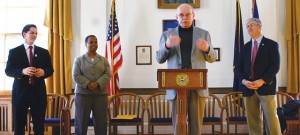Legislative Update – February 16th, 2011
Feb 16, 2011 • 8:20 pmThe State Treasurer recently released this year’s unclaimed property list. Please click here to see if you have any unclaimed property. If you need any help, please let me know.
Community Event
On Friday morning, February 11th, I attended a reception for outgoing City Manager Joe Gray. I read a sentiment from the State of Maine that highlighted City Manager Gray’s service to the City of Portland. Mr. Gray spent over forty years working for the City and was instrumental in projects like the Reiche School, Danforth Heights and Ocean Gateway. Portland would not be the city it is today if not for Joe’s tireless work over the years.
Click here to read more from the Portland Daily Sun.
Regulatory Reform Committee Public Meeting
Last Wednesday, I joined many of you at the Regulatory, Fairness and Reform Committee at Southern Maine Community College. Attendance was so high that we had to move into a bigger space, and the hearing was filled with many contrasting voices. On one end, members of the business community came to share their frustrations with duplication, licensing hassles, timeliness, and changing rules. On the other end, the environmental community shared their concerns about changing rules based on anecdotes, the lack of science, and rolling back decades of bipartisan bills that have reinforced Maine’s brand.
Click here to read more from the Portland Press Herald.
Portland Chamber Meet & Greet
Also on Friday morning, I joined two of my elected colleagues at the Portland Regional Chamber for conversations about the upcoming session. Each chamber member shared their concerns about the business climate. Themes from the morning were: health care costs, available workforce, high energy costs, and the lack of investments in higher education. It was good to share my feedback regarding what is moving forward in the Education Committee as well as the Regulatory, Fairness and Reform Committee.
Inside Augusta
Biennial Budget
Last Thursday morning, Governor LePage called a joint convention of the House and Senate to deliver his biennial budget. A biennial budget is a complicated math problem. The process is as follows: The sixteen policy committees work through their part of the budget and then make the recommendations to the Appropriations Committee. The Appropriations Committee has the final vote on the budget and sends it to the legislature where it needs a 2/3’s vote in both the House and Senate. The voted-on budget then goes back to the Governor for his signature or veto. I am still sorting through many of the specifics and wanted to share my quick highlights.
Overall, the Governor’s address felt like a campaign speech full of rhetoric. Calling his budget a “job bill,” he spoke mostly to the minority of people who voted for him. However, there were some good highlights for education: the budget does not cut higher education; it mostly fills the K-12 hole left because recovery funds are going away; it increases funding for Jobs for Maine Graduates. On first blush, the total aid for municipalities will be higher, but the actual effect for Portland is still unknown.
The Governor proposes to save over $524 million by altering the retiree system. From my perspective, this is one of the most challenging aspects of his budget. He intends to use this money to compensate for his tax cuts and consequently increase funding for education and municipalities. His income tax cut from 8.5% to 7.95% favors Maine’s wealthiest and reduces the circuit breaker rebate program, which provides tax relief for property owners and renters, by 20%. Finally, the Governor spent a lot of time confusing and misstating the facts about our long-term liabilities. He also vowed not to invest in bonding or borrowing for at least two years.
Click here to read more about the biennial budget at the Portland Press Herald.
Maine State Grant Program
Today, I will be testifying on my first bill of this session. I am sponsoring a resolve, which means a legislative study, to authorize the Finance Authority of Maine (FAME) to coordinate a review of the Maine State Grant Program (MSGP). The MSGP serves over 14,000 students, giving grants that average $1,000 per student per year. It’s Maine’s only need-based grant for our undergraduate students. Unfortunately, the grant program has been affected by declining state appropriations in recent years and has, therefore, failed to keep pace with rising tuition and inflation. I hope a comprehensive review of the program can occur so that MSGP can keep pace with the changing needs of Maine students.
Closing
The rest of this week will be busy. As the Education Committee continues it work, I will be voting on more of the Governor’s appointees for commissioner and working on dissecting the biennial budget. Please contact me with any questions or concerns.
-Justin
P.S. – Next week, I will review two more of the bills I have submitted this session.


